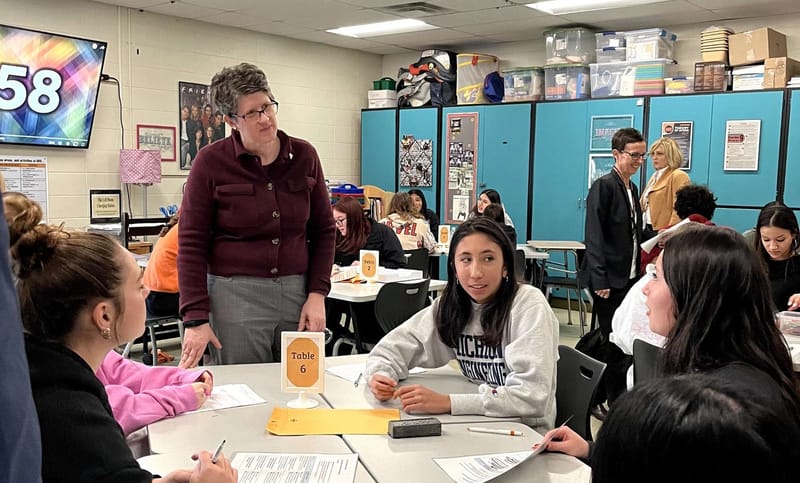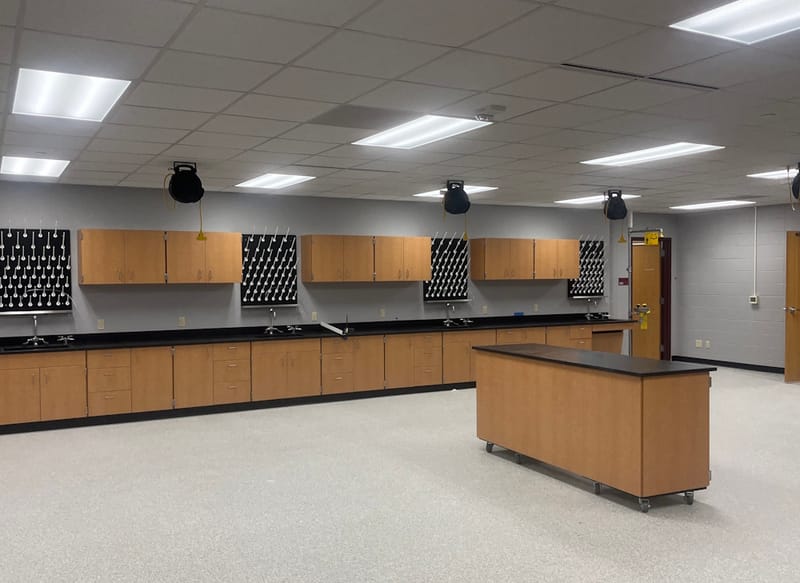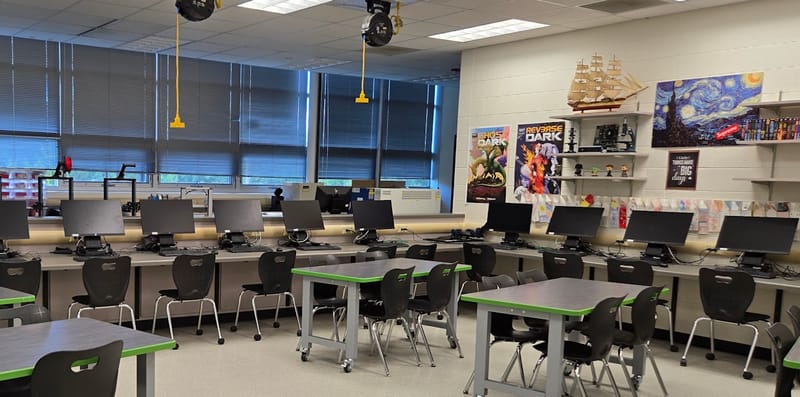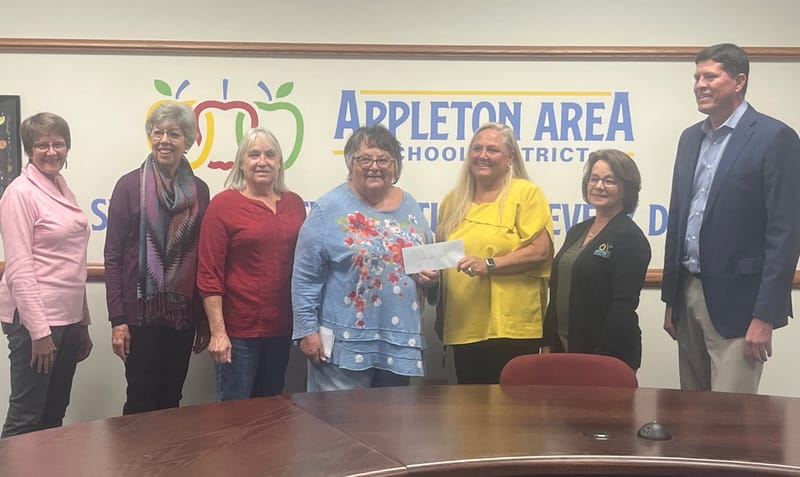Friends of Appleton Schools sounds alarm on AASD deficit
Public education advocates point to a variety of factors that put an unsustainable financial squeeze on public schools, including revenue limits and the loss to inflation since the state decoupled cost-of-living increases with state aid to education
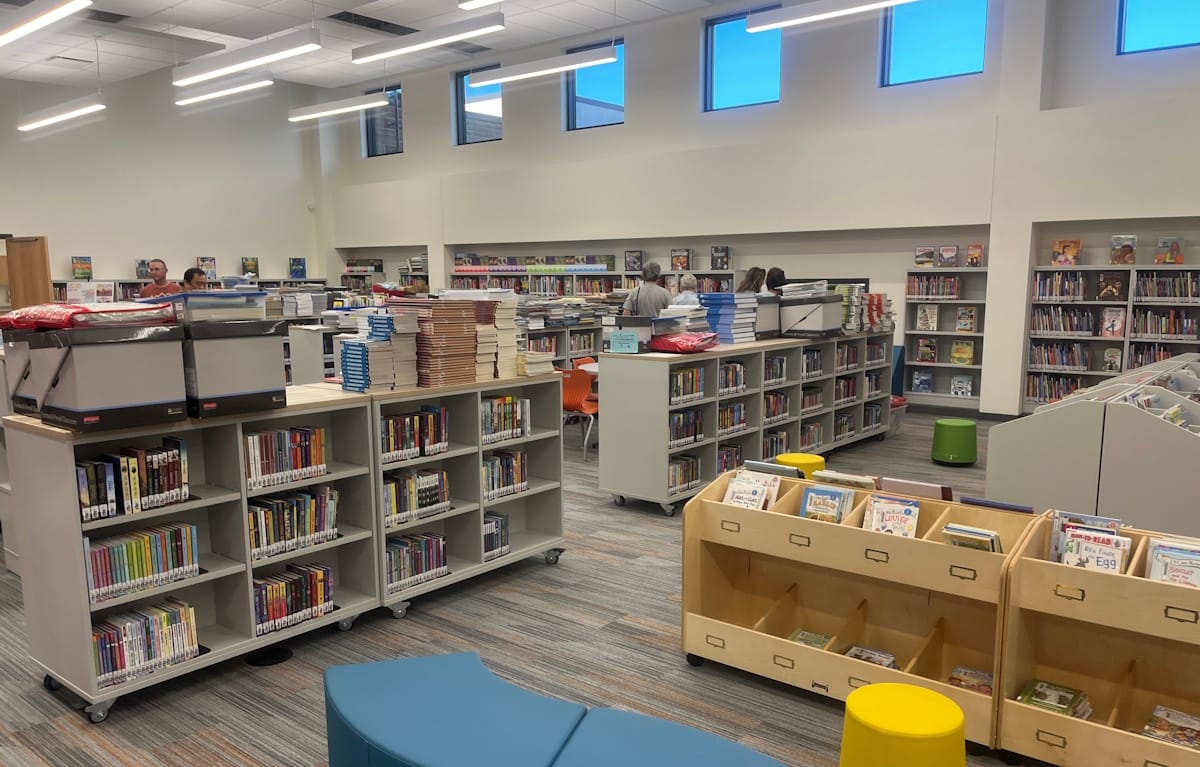
James Bacon is torn over how he thinks voters in the Appleton Area School district might receive a potential school referendum in April.
On the one hand, voters four years ago voted by one of the highest margins ever to support special taxpayer funding of $130 million for capital improvements. That money helped to fund, among other things, a brand new elementary school in rapidly growing north Appleton, as well as new classrooms, updated and new STEM labs and expanded and updated athletics facilities at various other schools throughout the district.
On the other hand, that was just four years ago and the request for more taxpayer dollars – this time an operational as opposed to capital referendum that would raise money for salaries, day-to-day costs, maintaining academic programs and overall general operating expenses – might be seen as coming along too soon after the last request.
“I think that, given what we saw in 2022, there is reason to feel optimistic knowing that we live in a community that cares a lot about education and wants to support our schools, our kids, our community at large,” said Bacon, a former AASD school board member and current member of Friends of Appleton Schools. “I think the thing that does give me a little bit of concern is it does feel quicker than we've gone to referendum in the past.”
Hearing from the voters
The fact is that the 2022 referendum was supposed to be on the ballot in 2020 but Covid pushed it back two years. Bacon says that doesn’t change the fact that AASD is looking at a $13 million deficit next year, the result, he and other proponents of public education argue, of decades-long neglect for public schools.
Friends of Appleton Schools (FoAS) has embarked on an education and listening campaign designed to alert voters to the consequences of the deficit – that, if left unresolved, will mean certain changes to public education – as well as to take the temperature of the public via surveys.
Voters have already received – or should soon receive – the survey in the mail. It can be filled out online using the special code attached. If there is more than one voter in the household there is a number to call to ask for another code so that others may fill out the survey.
Among the critical questions on that survey is whether the voters are willing to pony up more funding and if so, by how much. FoAS has put together four options, each with its own listed benefits and shortfalls: requests for $11 million, $13 million, $15 million or $17 million.
Bacon and FoAS believe that whether voters come through again depends on their understanding of public education: how it works, the recent history of its funding, and what it means for society.
“I honestly think people rarely do understand how schools are funded, and even that our property taxes that go to Appleton schools are actually separate from the city and other entities that you pay property taxes into,” he says. “And I think that, given the funding formulas and all the different pieces, such as vouchers, and the way those have changed over the years and the role those play, I actually do think it's challenging for people to fully grasp what it means.”
Public schools are funded via a combination of state aid and local property taxes. Additional federal dollars go to fund such specific needs as special education. But since 1995, the state has imposed permanent revenue limits on each district.
If a district needs to go beyond that limit, it must ask the voters for more money via referendums – which comes via higher property taxes. The Appleton Area School District has won referendums from voters in 1998, 2005, 2014 and 2022.
Has public education been neglected?
FoAS and other public education advocates point to a variety of factors that they say combine to put an unsustainable financial squeeze on public schools. Those aforementioned revenue limits headline the list but right beneath that, they say, is the loss to inflation since the state decoupled cost-of-living increases with state aid to education starting in 2008. Over that period, according to the Legislative Fiscal Bureau, per-pupil funding is down more than $3,500 in the Appleton Area School District, costing the district, conservatively, $54 million overall.
Then, too, they argue, is the impact of vouchers for private and parochial schools, paid for by taxpayers, but which siphon off what they say is essential funding for public education. Last year, more than $700 million went to fund state voucher programs and independent charter schools statewide. In Appleton, that amount was nearly $8 million. State voucher programs alone are estimated to suction up more than $700 million this school year.
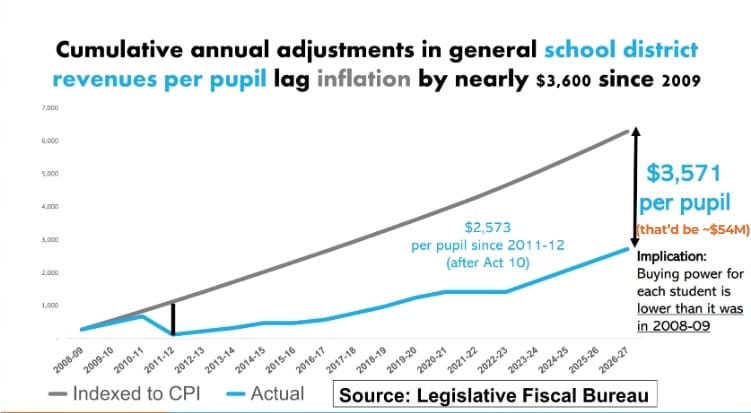
Other factors include the rising cost of health care, the state budget passed earlier this year that offered no increase in state aid, and a reimbursement rate for special education of just 42% (up from less than 30% before this year but still well short of the 90% rate voucher programs receive).
It’s worse for AASD, considering per-pupil funding in the district lags the state average by nearly $2,000 per student, ranking Appleton’s district 14th of 15 districts around the state.
All of this, Bacon says, is responsible for this year's $13 million deficit and why he believes the referendum is so vital.
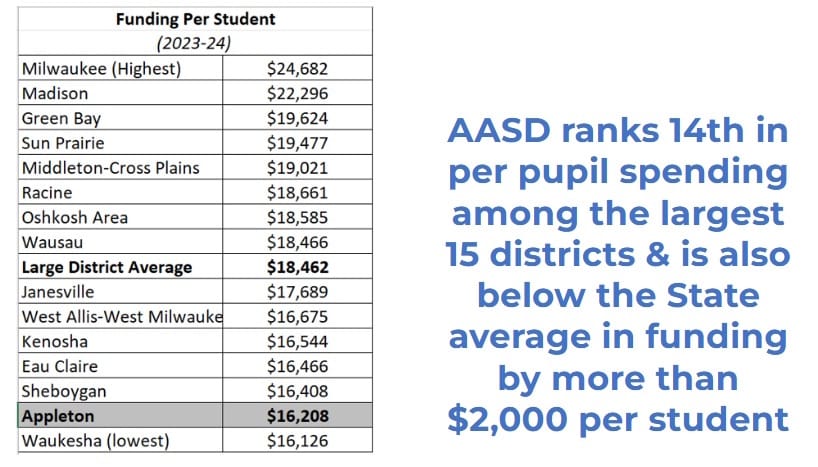
One thing public education proponents try to elucidate – though it’s never easy given that the very word tax is such a loaded one – is just how low Appleton property taxes are, relatively speaking. For example, in 2025 dollars, the Appleton property tax rate last year was $6.10, down from more than $9 in 2010. And that is despite a corresponding rise in property values of 144% over that period.
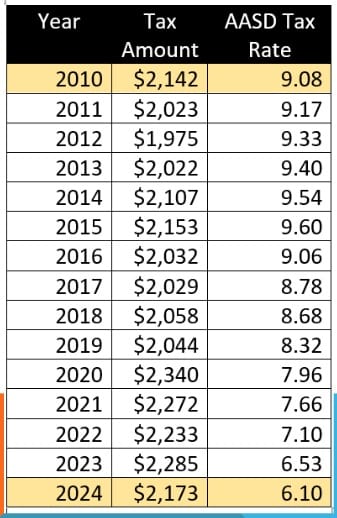
“I think most of us just pay our taxes and don't necessarily always know where they go and in what proportions they go where, and I think not knowing that also makes it harder to as a society to feel like we can hold our elected officials and our systems that are there to serve us accountable,” Bacon says. “I'm sure, to some degree, most people care (about public education), but maybe for some it’s more about can they afford to pay the taxes that they're being asked to pay. You know, across the board, it doesn't really matter who's taxing them for what purposes. I think that there's just the reality that some people are in a place where more taxes, no matter who it's coming from, is just not something that's palatable to them.”
Dire choices
Bacon warns of the consequences of further straining the AASD, what would be sacrificed if society chooses to turn a blind eye toward public education. The survey itself forces voters to reckon with that reality, asking them to choose among a variety of unhappy choices facing the district should a referendum fail. Those include closing schools, increasing class sizes, reducing mental health services, delaying updates for classroom materials and technology, reducing academic offerings, reducing the arts, athletics and other extracurricular activities.
While Bacon, a former educator who has worked in the industry in one form or another his entire career, understands the financial crunch Americans are feeling, he sees support for public education as a moral issue and hopes to convey that to wary voters before a potential April referendum.
“We've continued to pile more and more on our public schools and what we expect them to do and accomplish and then also not kept up funding for what that looks like to do those things,” he says. “But in general, I think that at the end of the day, public schools are an incredibly integral part of our society, of our democracy, of everything. I don't think there are many people out there that can argue against that even if you've got your qualms personally with maybe certain things about the public education system.
“You know it's important to make sure that everyone in our country has access to a great education, because they're going to be members of our society that we want to be contributing members of our society, and that can look a lot of different ways, but it's also the only system that exists currently to make sure every kid is able to access that.”
Bacon says FoAS would accept any of the four choices the voters would be willing to vote for. But he also admits that without a recognition of the ongoing issues the Appleton Area School District faces and without a willingness to address those in meaningful ways, the problem won't get resolved, merely postponed. And he thinks what's at stake is way too important for half-measures.
"I think that making sure we pass a successful referendum to show that our community cares about and wants to support our schools and our community through our schools is a success," he says. "I think we'll take it as a win however it comes. And so that's kind of the short-term goal.
"But I certainly am hoping that we can pass one that at least covers the deficit that we're looking at currently. So I would really, really love it if we can pass something that goes beyond that, because I think that might also help us get out of the cycle that I think is easy to get into in public education, where there's so much to do and accomplish and that you're trying to take on with such limited resources in so many ways and kind of a scarcity mindset and get more to an abundance mindset.
"Like, what can we do? What do we really want to achieve? What is the vision we have here? What world do we want to live in in Appleton? And how do we know and make sure kids are able to contribute to that now and in their future, because they're the future of our community."
Friends of Appleton Schools sounds alarm on AASD deficit © 2025 by Kelly Fenton is licensed under CC BY-NC-ND 4.0



